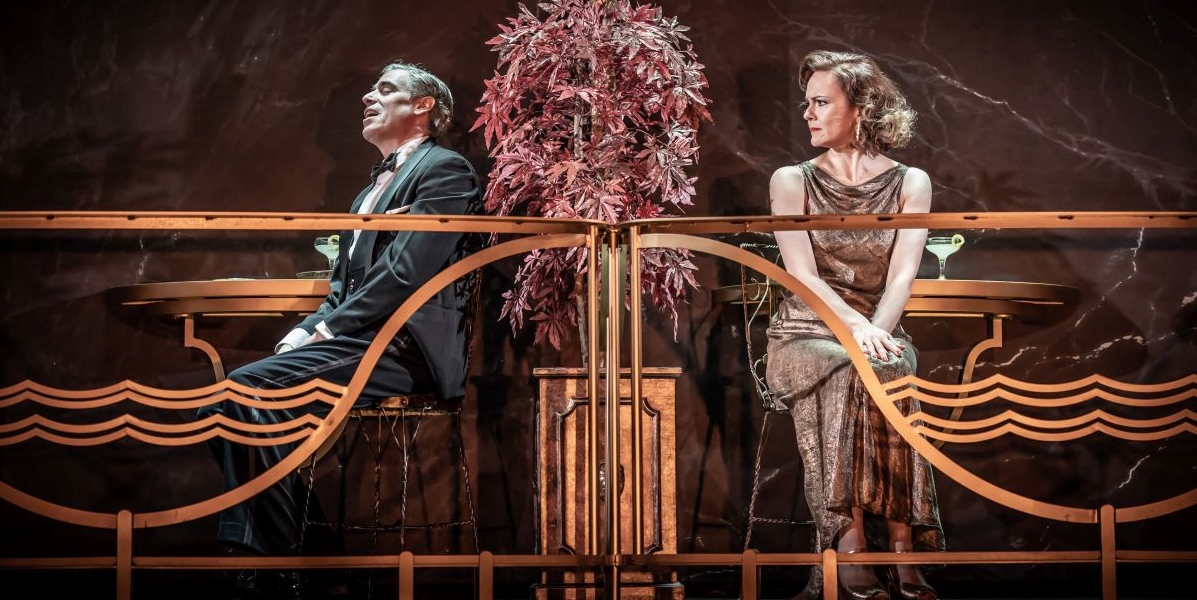Each generation reworks Coward’s classic 1930 light comedy in its own image. The last time I saw it was twenty years ago with Alan Rickman and Lindsay Duncan as the leads, Elyot and Amanda, elevating to perfection the precisely calibrated amorous jousting they had initiated in ‘Dangerous Liaisons’. If the essence of the play lies in ‘jagged sophistication’, then this new production directed by Michael Longhurst at the Donmar chooses to emphasise the jaggedness above all. There is a hint of this in the spiky, restless music played live on cello and violin with which we begin, and it culminates in a much more physically violent conclusion to the domestic quarrel in the second act than is usual. The emphasis is less on high spirits and suave elegance and more on the lasting and irreperable damage that can be inflicted by two people who can neither live nor without each other.
This is a play that is hard to shift from its original setting. There has to be a hotel balcony, and there must be a richly furnished Parisian apartment with a view – these are givens. Deco decadence dominates. What is not preordained is that the two are run together. Hildegard Bechtler’s wonderfully opulent, yet flexible set design encompasses both and allows an effortless segue from the first act to the second that gives the first half additional powerful momentum. Likewise it was a deft touch to have two live musicians to commentate archly at points on the action, and not merely to provide the earworm song that Coward wrote for the show. We even got some stroppy Elgar to start the second half!
But the success of the evening rests firmly on the shoulders of the four main actors. In the supporting roles, ungratefully written as they partly are, Laura Carmichael and Sargon Yelda found a lot more substance than is usual, both in pushing back on their unreasonable spouses, and in their own brittle hostility which comes to the surface in the final minutes. Again, as a sign of our times, Carmichael played Sibyl as less easily browbeaten than usual; and Yelda’s Victor was more patiently long-suffering, with less pompous, tweedy mansplaining than we are used to seeing.
The first act balcony scene reunion between Amanda and Elyot has claims to be the most perfect piece of theatre Coward created – its tight structure and spare, crisp dialogue needs to be played with absolute precision like a piece of music with punctuation, like notated rests, mattering just as much as words. I was not entirely convinced that Stephen Mangan and Rachael Stirling were quite yet in that peak performance groove, with insufficient variation in pace to pinpoint the shifts in mood. But in the second and third acts, where the action moves to Paris and the rapture of reunion moves into bickering and bitching, they very much came into their own. Mangan’s laid-back languor switched into a more dangerous, smouldering anger; and Stirling’s apparent flippancy crumbled into super-articulate, viciously intense rancour. There was a genuine sense of danger in the air, so that although you know how the act ends, all things suddenly seemed up for grabs as tempers flared.
Act Three can be an anti-climax in the wrong hands – you can sometimes sense a postponement of the inevitable tying up of loose ends with lots of meaningless stage business to fill in time. Not a bit of it here. There was a fine comic turn from Faoilleaann Cunningham as the grumpy much-put-upon French maid, and the four principals negotiated the many mood switches from regret to anger and finally to knock-about farce with considerable, pacy skill. The funniest moments of the evening were developed here – as so often – by playing the action with deadly seriousness. Never has coffee with brioches so successfully embodied both the intoxication and the venom behind a passion that has gone out of control.
This was a hugely enjoyable evening that showed once more how indestructible this play is and how open to fresh reinterpretation. The running time sped past, and such was the breathless intensity of the second act that the interval for once seemed earned and needed rather than a tiresome unsought interlude. I would also like to credit director and company for playing the text as written without silent edits to appease delicate sensibilities. While there are some lines that might raise contemporary eyebrows, this production demonstrated so well how the real technical challenge is to find a suitable way of playing around and with the concept rather than cancelling the text. This was just one of several lessons in the craft of acting that this deft production offers to those who wish to see.

